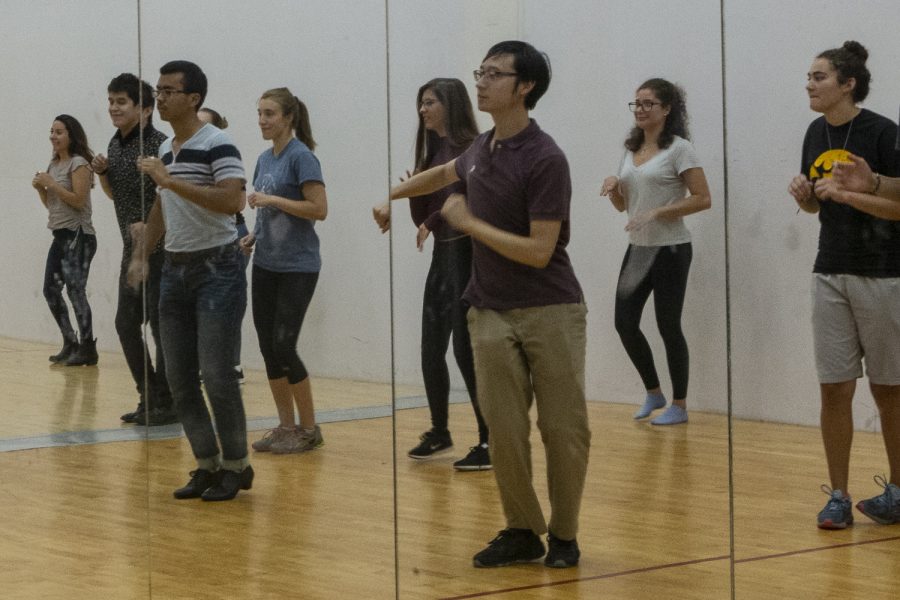Salsa Club chips in to get UI students moving
Freshman Solange Bolger started a new Salsa Club at the University of Iowa intending to help students understand other cultures, stay moving, and express themselves through dance.
Salsa Club meets on Friday, September 26, 2019 at Field House on the West Side of Campus for the first time this school year.
October 2, 2019
In a hallway dotted with office spaces on the fourth floor of the Field House, a small, hot room comes alive with explosive salsa music and dance on Friday nights. The room is lined with mirrors and filled to the brim with students of all ages, gender, race, and background sweating, smiling, and moving to the beat of the music.
This is the University of Iowa Salsa Club.
“It’s a very welcoming environment. It’s really about enjoying the culture,” Salsa Club President Solange Bolger said. “Dance is something that can unify all types of people. It doesn’t matter your skin color, your sexual orientation, your belief system — dancing is something that’s objective. It’s expression. It’s a great way for people to connect with themselves.”
Bolger began salsa dancing when she was 6 years old and now teaches the art with her parents at their salsa studio in her hometown.
“I wanted to bring Salsa Club to the UI, because there was no salsa club here at the time,” Bolger said. “There used to be a really big club here that was thriving but the scene kind of died. Since salsa is part of my culture because I’m Latina, it’s a very big part of my life. I wanted to bring that part that I love so much to the university and let other people love it as well.”
Bolger credits salsa as a major method of relieving stress in her life, and so does UI Graduate and Professional Student Government Vice President Thomas Pak, the former Salsa Club president.
“It’s a way to better express yourself,” he said. “It’s an outlet, and it can be very cathartic. You can just dance your worries away.”
RELATED: Popular-culture clubs on UI campus grow in number
Pak started his own Salsa Club in spring 2017 with his peer John Salcedo. The club gradually became inactive — until this year, when Bolger picked up where the two left off.
“Both John and I really enjoyed salsa dancing, so we thought it would be good to bring salsa to the university so it’s accessible,” Pak said.
In Bolger’s Salsa Club, ideals of respect and consent are paramount. Bolger stressed the importance of members alerting their dance partner to intended movements, and salsa as a co-equal kinetic relationship.
“There is a level of respect in salsa dancing,” Pak said. “Consent is very important in it, and Solange is great at making that clear.”
Bolger’s students thrive in her Salsa Club, not only learning the physical aspects of salsa dance, but gaining a diverse community in which to express themselves.
UI student and Salsa Club member Jarod Cheng said he is from a diverse area and came to the university for the Iowa Edge program, where he was with a lot of underrepresented students.
“But then when all the other students came, it was sort of a reverse culture shock because the students who kind of looked like me and talked like me were few and far between,” Cheng said. “Salsa Club is a space where there is a diverse crowd, and a lot of students can feel more at home.”
Cheng stressed the importance of dance as a way to express one’s feelings. He said he uses dance as a means to decompress and channel his emotions positively, and Pak agreed.
“Dancing to me is like another language or another form of expression,” Pak said. “Dance is universal, so when you learn how to dance, you learn how to express yourself in new ways and communicate with more people in this physical language.”






